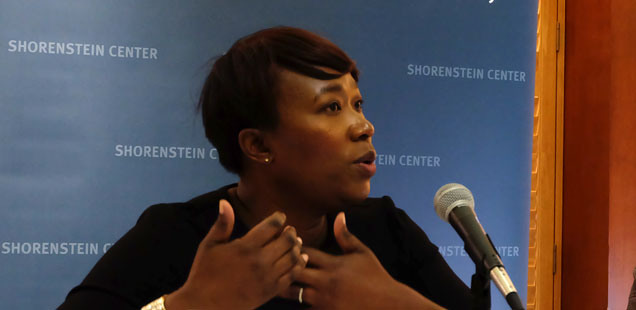Dear friends of the Shorenstein Center,
I don’t know about you, but I woke up Monday morning with a bad taste in my mouth, a sadness about the state of the country and the brokenness of our politics. After watching the presidential debate the night before, I could see the next few weeks playing out in a mad frenzy of accusations, hyperbole, and ugliness. Earlier this week, Elizabeth Drew spoke directly to the current moment in the campaign: “Already, not just the Republican Party but our body politic have sustained a serious blow. Now, there’s a new sense of peril—whether we will get through this election without chaos and violence. Much is in the hands of the outsider who came in, broke all the understood rules, and took over the party he’d chosen for the furtherance of himself. At some moments in our history our democracy can seem fragile. This is one of them.”
I disagree with Elizabeth Drew in one way: this is not in the hands of Donald Trump. It is in our hands, the hands of the American people, and we need to do something about it. But what? We need to start by talking about our collapsing political system and begin to imagine what will replace it. It is the only way we will find a solution. I believe it is not too late to save the Republic because I believe in the American mind. The American people can craft and invent a new political culture, with the institutions and systems to match, that take advantage of all the technological and social advances of the last three centuries. That conversation begins with you, with me, and (hopefully) with the present moment. On Tuesday, I asked our guest speaker Joy-Ann Reid what gives her hope about the future—and it was a remarkably hard question. What gives me hope is the history of American ingenuity, starting with the radical idea that we might leave behind a hereditary monarchy to govern ourselves.
Below we have a summary of what’s been happening around the Shorenstein Center this week, and we have much more to come. And if you need something other than politics, I recommend the Charles Simic poem, “Against Whatever It Is That’s Encroaching.”
Nicco Mele
Director, Shorenstein Center
This Week at the Shorenstein Center
Joy-Ann Reid: How Race Impacts the 2016 Election. Joy-Ann Reid, host of MSNBC’s “AM Joy” discussed the role of race within the Republican and Democratic parties, the Black Lives Matter movement, and the need for the U.S. to reckon with its history, among many other topics in a discussion with Shorenstein Center Director Nicco Mele. Read highlights of the conversation and listen to audio.
News from Our Faculty & Fellows
How Media Newsworthiness Norms Have Sustained the Trump Candidacy. Matthew Baum, Kalb Professor of Global Communication at the Harvard Kennedy School, argues that “the mainstream news media’s longstanding tools for determining what is or isn’t newsworthy have proven inadequate to deal with the candidacy of Donald Trump.”
The New Normal: Digital Defines Presidential Campaigns. Michael Slaby, spring 2013 fellow and digital strategist, examines how the technological landscape and its effect on campaigns has shifted between the 2008, 2012, and 2016 elections.
Why Clinton May Have a Chance in Dark-Red Georgia. Judy Woodruff, fall 2005 fellow and PBS NewsHour anchor visited Georgia to report on the state’s changing demographics and political climate.
Election Coverage and Commentary
What the Trump Tapes Can Teach Us about News Archives, from Poynter.
The Cautionary Tale of Billy Bush and Journalism Ethics, from MediaShift.
Martha Raddatz and the Case for a More Assertive Debate Moderator, from Columbia Journalism Review.
Primary Election Coverage: What Types of News Engage Audiences, from American Press Institute.
After Scrutiny, News Outlets Stop Conducting Unscientific Online Debate Polls, from Business Insider. BuzzFeed Will Team Up With Twitter On Election Night, from Huffington Post.
The Media’s Weimar Moment, from Columbia Journalism Review.
Business and Audience Engagement
Journalistic and Economic Values Are, Unfortunately, Not Correlated. For Now. From The Monday Note.
Second Clinton-Trump Debate Sees Big Ratings Drop Compared to First, from CNN.
Social Media
Facebook, Twitter, and Instagram Surveillance Tool Was Used to Arrest Baltimore Protestors, from The Verge.
Facebook Has Repeatedly Trended Fake News since Firing Its Human Editors, from The Washington Post.
Sign up to receive Media and Politics Must Reads in your inbox each week. Also connect with us on Twitter and Facebook for more updates.


